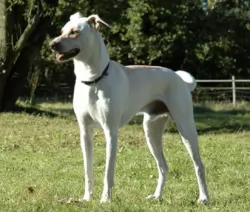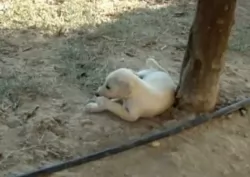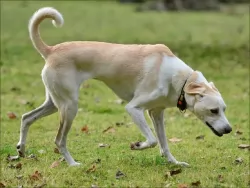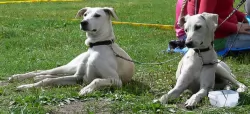 MyDogBreeds
MyDogBreedsMixed is originated from United States but Cretan Hound is originated from Greece. Mixed may grow 42 cm / 17 inches higher than Cretan Hound. Mixed may weigh 82 kg / 181 pounds more than Cretan Hound. Mixed may live 6 years more than Cretan Hound. Mixed may have more litter size than Cretan Hound. Both Mixed and Cretan Hound requires Moderate maintenance.
Many people are inclined to think that mixed breed or cross-breed dogs, also known as mutts or mongrels or designer dogs are just pavement specials. They think they look nothing much better than junkyard mutts.
This may be so, but not always, and these mixed breed dogs always seem to have hearts of gold. A Mixed breed is a dog that has parent’s who aren’t registered and who come from different breeds. In other words the parents aren’t of the same breed.
Guessing a cross breed’s ancestry can be difficult as these mixed-breeds have more genetic variation than pure breeds. They've been around since ancient times. The dogs originate in different countries and they all have different coats, different sizes and different temperaments.
It is sad but true – there are literally millions of mixed dogs worldwide, some of which never know what it is to live with- and be lovingly cared for by a human being.
 Although the Cretan Hound or the Kritikos Lagonikos is recognized in both Greece and Germany, the hunting dog breed is from the island of Crete, Greece. The dog’s history goes back thousands of years. It is an ancient breed and some believe it is one of the oldest hunting breeds in Europe.
Although the Cretan Hound or the Kritikos Lagonikos is recognized in both Greece and Germany, the hunting dog breed is from the island of Crete, Greece. The dog’s history goes back thousands of years. It is an ancient breed and some believe it is one of the oldest hunting breeds in Europe.
The Cretan Hound has been bred as a working dog, combining sight and scent to track down their prey. Today it is still a rare dog breed that you won’t easily find outside of Crete.
Greece kennels recognize this dog as well as some European kennels, but it isn’t recognized by the American Kennel Club.
Sometimes Mixed dog breeds come about from two dogs meeting on the streets and mating or it could be two pure-breeds accidentally mating, resulting in a mixed breed.
The mixed breed dog puppy could inherit looks from just the one purebred parent so that he grows up looking like a pure-breed. With a cross breed the standard for breeding isn’t the same for purebreds where the appearance and temperament is more or less the same.
A mixed breed dog doesn’t have these standards to conform to and they are as varied and unique as the colors in the rainbow. It’s not possible to know what a mixed breed dog’s puppies will look like. A typical example of a mixed breed is a Labradoodle. People love the temperament of the Labrador but they want the low shedding qualities of the Poodle as well.
Mixed breed dogs can be small or large and that means different litter sizes. If you don’t want your Mixed dog breed becoming a parent, you can spay or neuter your dog.
There are many people who avoid choosing a ridiculously high priced pure breed puppy and they prefer to choose a mixed breed. This is partly because these mixed breed dogs are healthy, resilient and nearly always a good match for you and your family.
 Known for its extraordinary scent abilities as well as its speed, this dog has always been used as a hare hunter because of these skills.
Known for its extraordinary scent abilities as well as its speed, this dog has always been used as a hare hunter because of these skills.
It’s a slender dog of medium to large size and stands at about 60-68cm in height and weighs between 20 – 30kg. It is lean, strong, muscular and swift with a body that is inclined to be longer than tall.
He is slightly heavier than other scenthounds and his ribs aren’t seen. The head is wedge-shaped and the ears drop down, are folded back or can be semi-erect. The eyes are dark and the tail is long and curves upwards with longer hair being found on the tail.
The coat is short and smooth, and coat colors of the dog are varied and can be fawn, sandy, grey, white, black or brindle, and it can be tri-colored too.
The Cretan Hound is alert to sight, sound and scent and when it senses prey, the tail moves in a circular way and the dog becomes rigid for a while before he is off on the hunt.
He is a gentle, intelligent dog, reserved around strangers but making an excellent family pet as he gets on well with all his human family members as well as pets in the house. With good training and socialization, the dog becomes more relaxed around strangers.
He isn’t an aggressive dog, and while he is alert to sounds and smells, he doesn’t make a particularly good watchdog.
Doesn’t matter what your Mixed breed dog looks like – he is a unique individual and you can never really predict what kind of a character he will turn out to be.
He might inherit a bit of placid behavior from one parent and a bit of clownish behavior from the other. It’s what makes them so special.
Ask most dog lovers who have owned a mixed breed and you will usually hear them say that they wouldn’t trade their amazing loyal and devoted pet for all the money in the world.
 The Cretan Hound is an energetic, curious dog, but when it comes to being a family pet, he is affectionate and gentle.
The Cretan Hound is an energetic, curious dog, but when it comes to being a family pet, he is affectionate and gentle.
He is a reserved dog around strangers. He likes to be busy and will love his walks and games with his human family members. He is smart so is readily trained and he likes to be obedient and to please.
The Cretan Hound will live in harmony with other dogs in the home and they’re also patient and good around disciplined children who have learned to respect animals.
Provide your Cretan Hound with his fair share of love and attention and he will go out of his way to be a loyal and loving family friend.
All dogs, whether pure breeds or mixed breeds, need to be excellently cared for. When you consider the unconditional love your dog gives you, you want to ensure that you’re kind and loving towards him.
Every dog can be prone to common dog illnesses and there are some genetic predispositions for dogs with certain breeds within them.
All dogs can battle with problem teeth, but it appears to be more rife with smaller dogs. Dental disease starts with tartar build-up and when it isn’t removed from the teeth it progresses towards infection of the gums and teeth.
What you need to know is that not caring for the teeth can mean your pet losing his teeth but also putting your dog in danger of joint disease and problems with the kidneys and heart.
Obesity is a huge factor in small- and large dogs and can pave the way for other diseases with your pet. Being obese can shorten the life of your pet because it contributes to heart disease, digestive disorders, back pain and joint problems.
Fleas, ticks, mites and worms can play havoc with the health of your pet. Some of these parasites can then be transmitted from your pet to you. Parasites can cause pain, weight loss and even death for your pet so it is important to be vigilant in these matters.
Bloat, when the stomach twists and fills with gas as well as cancer and heart disease are just some of the more common diseases to look out for.
 The Cretan Hound is a healthy, robust dog breed, but even so, he can suffer from some common health problems that other dogs are also susceptible to. Some of these are hip dysplasia , cancer, ear infections, bloat and cherry eye.
The Cretan Hound is a healthy, robust dog breed, but even so, he can suffer from some common health problems that other dogs are also susceptible to. Some of these are hip dysplasia , cancer, ear infections, bloat and cherry eye.
Remember that if you don’t want your dog to have puppies, they can actually benefit health-wise from being spayed or neutered. Doing this for your pet can prevent a number of health issues later on down the line.
Make sure too, that your puppy receives his vaccinations in a timely fashion so as to avoid terrible, life threatening illnesses such as parvo and rabies.
Good nutritious food, exercise, grooming, a dry place to sleep, taking your pet to the vet when he is sick as well as plenty of love and attention will ensure your Mixed dog breed’s health and happiness.
Keep die diet of your pet simple and consistent to avoid digestive problems. Quality commercially manufactured food is a good choice. Boiled chicken, brown rice and cooked or raw vegetables will be excellent added into your dog’s kibble from time to time. Add in some raw meat occasionally as it is good for warding off skin diseases.
Exercise your pet regularly, but don’t overdo it with young dogs as it can lead to joint problems later on in life.
 You’re certainly not going to have to do too much grooming with the Cretan Hound as he is a low maintenance breed.
You’re certainly not going to have to do too much grooming with the Cretan Hound as he is a low maintenance breed.
The dog is a short haired breed and an average shedder, so a good brush twice a week will keep the coat free of loose hairs and maintain the condition of the hair.
As with all dogs, the nails as well as the ears must be checked and attended to. The veterinarian can advise you on how to keep his ears clean and free of infection, as prodding around without knowing can damage his ears.
This Cretan Hound has high activity needs. He is energetic and also hard-working, and you’ll need to be taking him on long walks and providing him with some highly energetic playing sessions. Throw ball for him and take him with you when you go jogging or cycling.